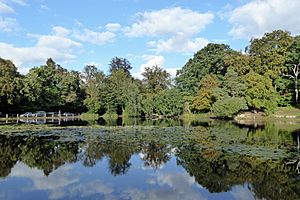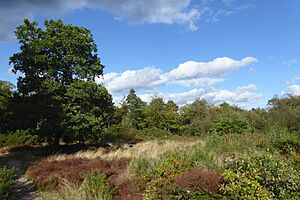Keston Common facts for kids
| Site of Special Scientific Interest | |

One of the lakes that form Keston Ponds
|
|
| Area of Search | Greater London |
|---|---|
| Interest | Biological |
| Area | 24.1 hectares |
| Notification | 1987 |
| Location map | Magic Map |
Keston Common is a large open space in Keston, London. It covers about 55 hectares, which is like 100 football fields! Most of this common is covered in heathland and grassy areas. It's a very special place because it's home to many important plants and animals. Because of this, almost all of Keston Common is a biological Site of Special Scientific Interest (SSSI). A small part of the nearby Hayes Common is also included in this special area.
Contents
Exploring Keston Common's Past
Keston Common has a rich history. Long ago, this land was part of a big estate called Holwood House. In the early 1800s, three ponds were built here. Their purpose was to supply water to the house.
Charles Darwin's Visits
Did you know that Keston Common was a favorite spot for the famous scientist Charles Darwin? His home, Down House, was only two miles away. Darwin often visited the common to study the plants and animals living there. His observations helped him write important books about earthworms and meat-eating plants.
In 2009, the British government tried to make "Darwin's Landscape Laboratory" a World Heritage Site. This area included Keston Common. Unfortunately, the application was not successful.
Becoming a Public Space
In 1926, the owner of Keston Common, Lord Stanley, gave the land to the local parish. This generous gift meant that the common became a public space for everyone to enjoy.
What Makes Keston Common Special?
Keston Common is important for many reasons. It is recognized as a Site of Metropolitan Importance for Nature Conservation. This means it's one of the best places in London for wildlife.
Ancient History and Nature
The common is also an Area of Archaeological Significance. This means there are old earthworks here that are protected as historical structures. These earthworks give us clues about how people lived long ago.
Today, two of the ponds at Keston Common are used for fishing. A group called the Friends of Keston Common works hard to protect and care for this special place. About 21.5 hectares of the common is registered as Common Land. This means it's land that local people have traditional rights to use.
How to Visit Keston Common
You can easily get to Keston Common from a few different roads. These include Westerham Road, Heathfield Road, and Fishponds Road. It's a great place to explore nature and learn about history!
Images for kids
 | Emma Amos |
 | Edward Mitchell Bannister |
 | Larry D. Alexander |
 | Ernie Barnes |



